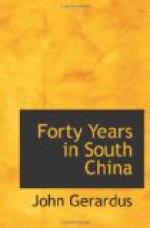“When Mr. Burns arrived at Amoy, providentially he found and secured a room not far from our church edifice, and near to the residences of several of our church members. As soon as he was able to use the dialect of Amoy, many of our church members and inquirers were glad of the privilege of meeting with him daily for the study of the Scriptures and for prayer. Mr. Burns came to Amoy for the simple purpose of preaching the Gospel. He did not wish to take the responsibility of organizing a separate church. He was ready to co-operate with us or with the London brethren. He often rendered them assistance likewise. When he became able to use the language with freedom, he often preached in our church. When he went out for street preaching, or went out to visit the towns and villages around, he always took with him native Christians, usually the members of our church, having been providentially placed among them. Early in the year 1854, Mr. Burns with some of our church members visited the region of Peh-chui-ia. Much interest was awakened in that region in the subject of Christianity. A goodly number, we trust, were born of the Spirit. Mr. Burns did not wish to take the responsibility of a pastor, desiring to keep himself free for evangelistic labors wherever a door might be opened before him. He requested us to examine the candidates for baptism and receive those whom we deemed worthy, and take the pastoral care of them. We yielded to the desires of Mr. Burns and took charge of Pehchui-ia.
“Mr. Burns continued to spend much of his time in that place and vicinity until he was called to leave Amoy. Shortly after the departure of Mr. Burns, learning that the English Presbyterians would have been glad to retain Peh-chui-ia, and Mr. Johnston (E. P.) being willing to take charge there as far as he was able, we very willingly relinquished it to them. He was still unable to use the language with freedom, so we continued to visit the place as often as we could. Before Mr. Johnston’s knowledge was sufficient to relieve us of the pastoral care of that interesting church, his ill-health compelled him to return to his native land. His place was soon supplied by the arrival of Mr. Douglas. We have continued the same pastoral care of that church. Lately our visits to the place have become less frequent, as Mr. Douglas has become better acquainted with the language.




